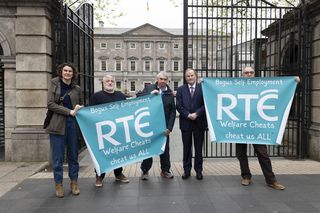Beyond repeal: What comes after the Eighth?
Last month, thousands marched on Dublin's streets calling for abortion to be legalised, and next week the first sitting of the Citizens' Assembly will debate the issue. With the pro-choice campaign claiming we are hurtling towards an inevitable referendum, our reporter talks to people on both sides of the debate about what comes next
It is, for some, the must-wear item of the season: a simple, long-sleeved black sweatshirt, with REPEAL emblazoned across the chest in white lettering. It's both a political and fashion statement and it is difficult to walk through the streets of Dublin - or any other Irish city - and not see these distinctive tops sported by young women and a smattering of men.
When abortion rights campaigner Anna Cosgrave came up with the idea, she conservatively thought 100 tops might be shifted. But demand has been so high that the supplier can barely keep up. Sale proceeds help fund the Abortion Rights Campaign (ARC) and the very sight of the six-letter word ensures that the most contentious issue of the day stays firmly in the public mind.
Ireland's abortion legislation is, along with laws in Northern Ireland, Malta and Andorra, the most restrictive in Europe. It is only permissible in cases where the mother's life is deemed to be at risk.
The death of Savita Halappanavar in University Hospital Galway from complications caused by a septic miscarriage at 17 weeks' gestation was seen as a tipping point that helped galvanise the pro-choice movement and lead Ireland to a point where the Citizens' Assembly will meet next week to consider all arguments in the most divisive of national conversations.
The assembly will be comprised of 100 Irish citizens and chaired by Justice Mary Laffoy, a serving judge of the Supreme Court. "The programme for a partnership government," Taoiseach Enda Kenny said in July, "commits the Government to the establishment of a citizens' assembly, within six months and without participation by politicians, with a mandate to look at a limited number of key issues over an extended time period."
The Eighth Amendment will be the first issue it will examine and conclusions will be forwarded to an Oireachtas Committee.
It looks increasingly likely that a referendum on whether or not to repeal the Eighth Amendment of the Constitution, introduced in 1983, recognising "the right to life of the unborn and, with due regard to the equal right to life of the mother, guarantees in its laws to respect, and, as far as practicable, by its laws to defend and vindicate that right".
But what happens after such a referendum if - as all recent polls appear to indicate - the people vote to repeal the amendment? Is that when the true pitched battle for abortion rights really begins?
"It would be the first step in the right direction," says Janet O'Sullivan of the Abortion Rights Campaign, the umbrella organisation representing several lobby groups both in the Republic and in Northern Ireland, "but it certainly does not mean that the floodgates open. It would just be a change in the Constitution - the law stays exactly the same. And, let's not forget, it's a law that dates to the 1861 Offences Against the Person Act.
"But we can't move forward if the Eighth Amendment stays as is, which I don't think it will when put to the people in a referendum. There really is an appetite for change out there, and we've seen that appetite grow over the past five years.
"More than 160,000 Irish women have had to travel to Britain for abortions since the Constitution was changed in 1983, and in the past couple of years, you have a situation where women are feeling comfortable enough in talking about their own abortions. Two-and-half years ago, I spoke publicly about an abortion I had at 18. That's not something I would have done even five years ago."
While the focus of much of the pro-choice lobbying has centred on three little worlds - "Repeal the Eighth" - O'Sullivan says the Abortion Rights Campaign has always had a far wider scope. "We believe women should have the right to autonomy over her own body," she says. Abortion, she adds, in deference to the motto emblazoned on ARC's T-shirts, should be "free, safe and legal".
Now 41, she believes that by the time she hits 50, Ireland will have the sort of liberal abortion laws that she could have only dreamed about when she had to travel to England for her own abortion. "My daughter is 16 now, and I really believe the will is there for change to have taken place by the time she's in her mid-20s. There's a new generation of politicians who are not afraid to speak up in favour of abortion rights."
Last week, six TDs - Ruth Coppinger, Bríd Smith, Gino Kenny, Mick Barry, Paul Murphy and Richard Boyd Barrett - all sported Repeal tops in the Dáil during Leader's Questions.
Also, Fine Gael's Kate O'Connell has regularly spoken about her desire to see abortion services introduced while her party colleague, Health Minister Simon Harris, was moved to thank a pair of anonymous women on Twitter who live-tweeted their trip to England in August to undergo an abortion.
"I felt it was appropriate and important as the Minister for Health for me to acknowledge the fact that these were Irish citizens telling their story and telling their experience," he later clarified.
Despite such overtures, O'Sullivan says many politicians have resisted attempts to have a meaningful debate on abortion. "Heels have been dragged on this issue for too long," she says. "But the groundswell of popular support cannot be ignored."
Dr Vicky Conway of Dublin City University's School of Law and Government anticipates a repeal of the Eighth Amendment when it is eventually put to the people. So confident is she of that outcome that she, along with nine lawyers and law academics, wrote a draft 'Access to Abortion Bill', which has been published online as an open access document.
In short, it recommends that abortion rights be available to women in the first trimester of pregnancy to (quoting from the proposed bill) "bring Irish practice closer to that of other European jurisdictions, while stopping short of the European norm in relation to abortion on request. Almost every European jurisdiction allows abortion de jure or de facto on request up to 12 to 14 weeks."
Conway believes it is essential that abortion is decriminalised, and a decision to repeal the Eighth would mean there is no longer any constitutional imperative for criminalisation either of abortion procedures, or of the provision of abortion information. At present, the penalty for having an abortion in Ireland when a woman's life is not at risk is a prison term of up to 14 years. A Red C poll on behalf of Amnesty International revealed that 64pc were not aware it is a crime to have an abortion here (when life is not at risk), and less than one in 10 know what the penalty is.
Conway says the bill is conservative by international standards, but points out it wasn't written in an environment where she and her co-authors felt they had a free hand. "But, in terms of international human rights law, it provides the guarantees necessary to protect women from the most damaging encroachments of state and medical power."
In June, a UN Human Rights Committee declared Ireland's abortion laws to be "cruel, inhuman and degrading" as well as discriminatory, and were in violation of the International Covenant on Civil and Political Rights. Its hard-hitting words were widely reported internationally as it called on Ireland to "amend its law on voluntary termination of pregnancy, including, if necessary, its Constitution, to ensure compliance with the Covenant, including effective, timely and accessible procedures for pregnancy termination in Ireland, and take measures to ensure that healthcare providers are in a position to supply full information on safe abortion services without fearing being subjected to criminal sanctions".
For the pro-choice campaign, it was a powerful call-to-action, but not everyone involved in the movement is happy with the direction being taken. One campaigner, who does not wish to go on the record, says she has found it frustrating that there appears to be so little joined-up thinking when it comes to how liberal any future abortion laws should be.
"Everyone agrees that the Eighth has to go," she says, "but there's no agreement about what exactly we should campaign for should that happen. Should we go down the English route and make abortions possible up to week 24? Some think it should aspire to something more liberal even than that while many, me included, think it should be more conservative. I think the Danish model would be perfect for Ireland - abortion up to 12 weeks, and where the cost would be borne by the State.
"But I felt I was being shushed when I mentioned that to fellow pro-choice campaigners earlier this year - I think they thought I was being too conservative, but I really believe that a sensible, conservative approach is what many Irish people want."
Another pro-choice activist says it is unfortunate some of the narrative, especially on social media, has chosen to exclude men and to rubbish the views of anyone from "the other side".
"I'm hopeful that the Citizens' Assembly will allow for meaningful, mature discourse," she says.
"It's badly needed. I want Ireland to move in line with the European norm when it comes to access, but I'm not sure that day will come in my lifetime. While people may feel that abortion should be allowed in the cases of rape, incest and fatal foetal abnormality, I don't know if enough feel that it should be available simply for unplanned pregnancies."
The Red C poll in March seems to bear this theory out, indicating that 38pc favoured abortion to be made available as the woman chooses.
For Cora Sherlock of the Pro Life Campaign, any talk about a landscape post-Repeal is presumptuous. "I genuinely don't believe the Eighth will be repealed," she says. "The pro-life people talk about a huge shift, yet they had no more than 10,000 people on the streets last month [for the fifth annual March for Choice]. I'm meeting people every day who say they will not vote for it because it could pave the way for abortion and they recognise that there are two lives involved. It's not like the marriage equality vote last year - there are no easy, neat solutions."
Sherlock says abortion proponents have reduced the discussion to a simple one-worder, Repeal, and sometimes have been unwilling to "talk about the realities of abortion". Not for them, she insists, any willingness to accept that for some, such as the founders of the Irish-run Women Hurt support group, an abortion is something they regret for the rest of their lives. "The pro-side will continue to frame their narrative in a certain way," she says. "I'm not saying all of them think that way, but some simply don't want to think of what abortion actually means."
Sherlock believes if the Eighth is repealed, Ireland is heading down a road of liberalised abortion practices, similar to the situation in Britain. "Abortion has become normalised there," she says, "despite what the experts said in the years before the Abortion Act of 1967 came into being."
Petra Conroy of Catholic Comment, an organisation that promotes the voices of lay Catholics in the media, believes that for all the bluster on both sides, there has yet to be a proper debate on all the issues at hand.
"The tactic of the abortion campaigners seems to be reduced to a simple 'My body, my choice' line, but the reality is so much more nuanced and complex than that. And their interpretation of a feminist is someone who adheres to what they believe, but what about someone like me who's outraged that men are often paid more than women, but also believes in the right to life of the unborn?"
Conroy says liberal abortion practices elsewhere are having a profound impact on the way life is regarded and points to Denmark, where there are virtually no children born with Down syndrome nowadays, so common is it for such pregnancies to be terminated there. "The documentary, A World Without Down's Syndrome [screened on BBC2 on Wednesday evening], showed how much joy children with Downs can bring," she says, "and yet, thanks to liberalised abortion practices, such people are not being afforded the right to life."
Janet O'Sullivan, meanwhile, is determined to keep the abortion rights fight on the agenda and suggests that, as last year's marriage equality referendum showed, Ireland is throwing off old, conservative shackles. "It isn't acceptable in 2016 that up to 10 women every day are having to travel to another country for abortions," she says. "Not only is it stressful and emotionally draining to have to leave home, but it is very expensive, too.
"But those numbers will continue to travel well into the future unless the issue is tackled head-on. If the penalty of 14 years' imprisonment is retained, they'll be travelling, and if abortion is only available in very limited circumstances, they will be travelling too. And if there's no change to the law in an Ireland where the Eighth Amendment is gone, they will be going to England in their droves just like they've been doing for decades."
What next
A country without the Eighth would be a much less caring, compassionate and liberal place'
Wendy Grace, freelance journalist and Spirit Radio presenter
Wendy Grace
How can we possibly consider what a world without the Eighth Amendment might look like if we've never seriously looked at the reality of abortion laws in other countries? The debate in Ireland is so one-sided at present, the public is getting no opportunity to reflect on what an abortion culture entails. To date, I have yet to see the majority of the media cover this issue in a fair and balanced way, which tells both sides of the story.
Eight out of 10 Irish people oppose wide-ranging abortion according to recent Behaviour and Attitudes poll. If the Eighth Amendment is repealed, that is exactly what we will get. I fear, like in every other country where so-called restrictive abortion has been introduced, we will lament exactly the same thing happening in Ireland.
Children with disabilities being aborted up until birth, women being pressured by family members or partners to have an abortion, babies being born alive and left to die and women being disempowered by culture that expects abortion to happen in certain circumstances.
Proponents of abortion always shout "scaremongering" when this is pointed out but for anyone who watched the documentary on BBC2 earlier this week called A World Without Down's Syndrome, it was plain to see just what happens when abortion becomes accepted and the right to life of the unborn child is conceded. Some 90pc of babies diagnosed with Down syndrome are now aborted in the UK. What an appalling reality.
A lot has changed since abortion was introduced in countries like the UK in the 1960s. Back then, we didn't have the same ultrasound technology that showed a baby is fully formed at just 10 weeks' gestation and can be seen kicking and moving in the womb.
Before this debate goes any further, we need to take a step back and consider what exactly a repeal of the Eighth Amendment would mean. Right now, one in 19 Irish pregnancies ends in abortion. In the UK, one in five pregnancies ends in abortion. There is no question the Eighth Amendment has saved tens of thousands of lives and the same number of mothers have been spared having to go through with a procedure that takes away the life of their child. A country without the Eighth Amendment would be a much less caring, compassionate and liberal place, contrary to what the many advocates in the media would have us think.
'In this legal environment, health is the silent victim'
Philomena Canning, midwife
Philomena Canning
As midwives, our role is gatekeepers of normal birth for healthy women and their babies, who comprise some 85-90pc of the childbearing population. The Eighth Amendment stands as a significant impediment to this, as it erodes the woman's central role in decision-making about her care. This is confirmed by the HSE National Consent Policy, which stipulates the significant legal uncertainty regarding the extent of a pregnant woman's right to refuse treatment.
When the Eighth was introduced in 1983, the C-section rate in Ireland was 6pc; today it is a staggering 30pc. This correlation is not coincidental; the existence of the Eighth supports over-medicalisation in pregnancy and childbirth. In a legal environment where consideration need only be given to the life of mother and baby, health is the silent victim.
My vision as a midwife of what will replace the Eighth is the alignment of women's entitlement to high-quality maternity care with international human rights standards, where the woman is the central agent through informed decision-making, facilitated by her maternity healthcare provider. Building the capacity of maternity caregivers to adopt a human-rights based approach, and imposing legal obligations therein, are the measures required for a climate where pregnant women can no longer be threatened with a high court order to gain their compliance with non-evidenced-based medical intervention.
‘I feel the British limit for abortion up to 24 weeks is a bit too far....’
June Caldwell, writer
This is the way the war on women’s bodies — the 10 Irish females who are forced to travel to Britain every day for abortions — should end. If Article 8 is repealed in a referendum, then I would hope that abortion is available to every one of the future 10 women per day who otherwise would have to go to a clinic in Liverpool, Manchester or London.
It seems to me it would be wrong to discriminate against a woman’s right to choose and simply restrict terminations in Irish hospitals to those who are victims of rape or are suffering from fatal foetal abnormalities where their pregnancies are doomed. Of course these women should be given the right to end their pregnancies in these cases at home, near their family, in Ireland.
Yet there are other women who never take the decision to have an abortion lightly and who are also trapped by pregnancies they do not want to continue with. They include women mired in poverty or imprisoned in a violent marriage/relationship or are in no psychological state to go ahead with that pregnancy. Rather than allow the final say to be in the hands of medics or psychologists, at the centre of choice should be women themselves.
Given advances in bio/medical technology, I feel that the British limit for abortion up to 24 weeks is a bit too far down the pregnancy-gestation period. In my view, the limit in Irish hospitals could be 18 weeks.
Even then, of course, the war on women will continue and we can still expect daily holy vigils in hospital car parks from Letterkenny to Limerick, Dungarvan to Dublin.
'It should be regulated through sensitive legislation and gestational time limits'
Justine Delaney Wilson is a mother and writer
Justine Delaney Wilson
I absolutely support the repealing of our Constitution's strict anti-abortion laws. The fact that we voted to allow our women to travel to the UK to avail of a health service, while refusing to provide the same procedure for them here at home, angers me. We don't have as great a difficulty with it once we don't have to actually see or engage with it.
Public support for liberalisation of the Irish regime is growing, but I think that for the repeal movement to be successful, the framework for legislation that will replace the Eighth needs to be made clear. Otherwise votes for the motion will be lost in the fog of confusion and fear.
Personally, I'd favour a repeal of the entire amendment. I'd like to see access to safe abortion across Ireland in the tragic cases of fatal foetal abnormality and rape, but also more generally. The decision to terminate is never an easy one and it's not for me to decide whether a woman is sufficiently distressed, impoverished, young, old or otherwise.
Women must be given bodily integrity and autonomy, and we must be trusted to make this most personal of choices.
I'd like to see the service regulated through sensitive legislation and gestational time limits, as it is in other European countries.
I have three children, the youngest of whom has Down syndrome, and I support the removal of the Eighth Amendment so that ALL babies who are born are wanted and cherished.
Join the Irish Independent WhatsApp channel
Stay up to date with all the latest news














